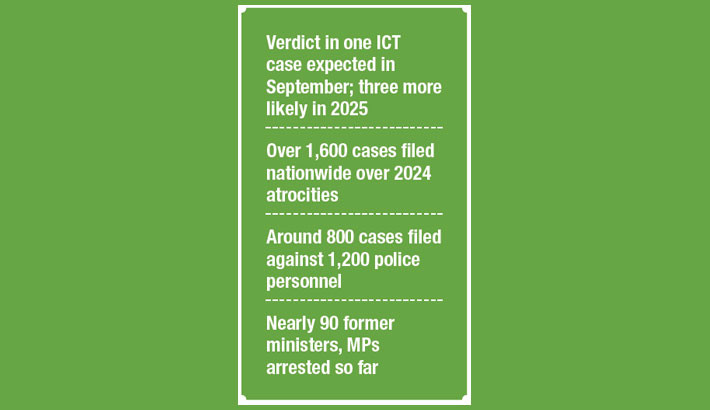Landmark verdicts near in July atrocities cases
Ehsanul Haque Jasim, Dhaka
Published: 07 Aug 2025

Visible progress in the trial process of cases filed over the atrocities committed during the 2024 mass uprising, alongside corruption and human rights violations under the Awami League regime, is shedding new light a year after the fall of the autocratic government.
Trials related to the 2024 mass killings are underway at the International Crimes Tribunal (ICT), with proceedings at two separate tribunals making notable headway. A verdict in one of the ICT cases, in which ousted Prime Minister Sheikh Hasina is an accused, is expected as early as this September. Verdicts in several other cases are anticipated before the end of 2025.
In addition to departmental actions, trials for crimes including corruption, extrajudicial killings, and human rights abuses committed under Sheikh Hasina's Awami League rule are proceeding in regular courts.
The interim government led by Prof Muhammad Yunus assumed office on 8 August 2024. As of yesterday (7 August), a year has passed since the administration took charge. During this time, numerous cases have been filed, and many are now at various stages of trial in different courts.
According to available data, a total of 1,602 cases – among them 638 murder cases – have been filed across the country against attackers, instigators, and commanding officers involved in assaults and killings during the student-led mass movement of 2024.
However, nearly all cases that were filed during the movement (from 1 July to 5 August 2024) have since been withdrawn nationwide.
Nearly 90 former ministers and MPs from the ousted regime have been arrested. A report by Transparency International Bangladesh (TIB) notes that as of 1 June 2025, 87 such individuals had been taken into custody. Since then, others including former MP Naimur Rahman Durjoy have also been arrested.
Investigations in the majority of the cases have shown satisfactory progress, with nearly 100 murder case investigations now in their final stages.
Legal action has also been taken against members of law enforcement agencies involved in killings during the 2024 uprising. Around 800 cases have been filed against approximately 1,200 police personnel across the country; 61 officers had been arrested as of 8 July 2025.
The International Crimes Tribunal was reconstituted under the current government. To date, 429 complaints and 27 cases have been filed, implicating 206 individuals, including Sheikh Hasina. Of these, 73 have been arrested.
Formal charges have been framed in four ICT cases, including one concerning crimes against humanity brought against Hasina and two of her close aides. That trial is now in progress.
So far, five witnesses have testified against Hasina and the two co-accused. A verdict in this particular case is expected by the end of September.
In addition, charge sheets have been submitted in several other ICT cases, and formal trials have begun – paving the way for more verdicts by the end of this year.
The trial over the murder of Abu Sayed – a student of Begum Rokeya University, Rangpur (BRUR), and the first martyr of the 2024 uprising – has commenced at the ICT. The tribunal framed charges on 6 August, and a verdict is expected later this year.
On Thursday (7 August), the ICT also began a charge-framing hearing in the case concerning the killing and burning of six young men during the 2024 uprising in Ashulia, Savar. A verdict in this case is likely in 2025.
The prosecution on the same day submitted a charge sheet in another case, which relates to the fatal shooting of a young man hanging from a cornice of an under-construction building and the killing of two others in Rampura, Dhaka, during the uprising. Previously, a charge sheet had been submitted in the Chankharpool massacre case. Verdicts in both cases are expected next year.
Hasina is also facing two additional cases at the ICT – one concerning allegations of enforced disappearances and extrajudicial killings during the Awami League’s 15 and a half years in power, and another over the killings during the Hefazat-e-Islam rally at Shapla Chattar, Motijheel, in 2013.
Outside of the ICT, significant progress has also been made in some high-profile cases in regular courts. On 31 July, two Dhaka courts indicted 100 accused individuals – including Sheikh Hasina and her sister Sheikh Rehana – in six corruption cases relating to alleged irregularities in the Purbachal New Town Project.
Other accused include Hasina’s son Sajeeb Wazed Joy, her daughter Saima Wazed Putul, and Rehana’s children: British MP Tulip Rizwana Siddiq, Azmira Siddiq Rupu, and Radwan Mujib Siddiq Bobby.
The Anti-Corruption Commission (ACC) filed six separate cases against them in January 2025, accusing them of abuse of power and favouritism in securing allocations of government plots in the Purbachal project.
In a major development, former chief justice ABM Khairul Haque – widely seen as the legal architect behind the country’s slide into authoritarianism – was arrested on 25 July. He is now facing a raft of legal complaints, including charges of judicial manipulation, sedition, corruption, and involvement in a murder connected to the 2024 mass uprising.
Meanwhile, a dedicated commission was formed to investigate enforced disappearances under the Awami League regime and deliver justice to victims. The Commission for Enforced Disappearances has so far received 1,850 complaints, of which 1,350 have been verified. Two interim reports have already been submitted.

